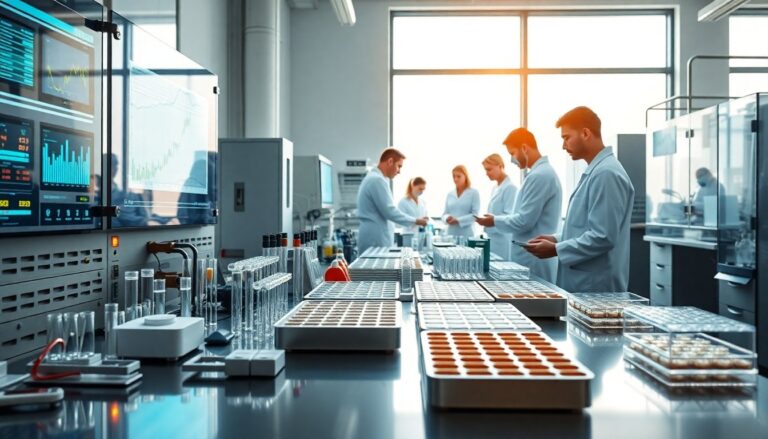Argomenti trattati
The field of biotechnology is rapidly evolving, offering innovative solutions to significant challenges in healthcare. Understanding the impact of these advancements on patient care, disease management, and health outcomes is essential.
Current advancements in biotechnology
Modern biotechnology includes a diverse range of techniques and applications that utilize biological systems to create products and technologies. Notable advancements encompass gene editing, personalized medicine, and biomanufacturing.
Gene editing and CRISPR technology
One of the most significant advancements in biotechnology is CRISPR-Cas9 technology, which enables scientists to edit genes with remarkable accuracy. This genome editing tool holds promise for treating genetic disorders by directly correcting mutations in DNA. Researchers are investigating its application for conditions like sickle cell disease and Cystic Fibrosis, with the goal of offering lasting solutions instead of temporary remedies.
Personalized medicine
Personalized medicine signifies a transformative approach in healthcare, moving away from the traditional one-size-fits-all model. By leveraging an individual’s genetic information, healthcare providers can customize therapies to improve effectiveness and minimize side effects. This shift is primarily driven by advancements in genomic sequencing and biomarker identification, which facilitate the creation of targeted therapies for conditions such as cancer.
The future implications of biotechnology in healthcare
Looking toward the future, the potential of biotechnology in healthcare is extensive and multifaceted. Innovations in diagnostic tools and enhancements in drug development processes suggest a promising landscape ahead.
Transforming diagnostics
Biotechnology is poised to significantly enhance diagnostics. The introduction of liquid biopsies and advanced imaging techniques is making early disease detection, particularly for cancer, increasingly achievable. These innovations facilitate earlier interventions and minimize the need for invasive procedures, ultimately enhancing patient comfort and outcomes.
Expediting drug development
Furthermore, biotechnology is expected to expedite the drug development process by leveraging artificial intelligence (AI) and machine learning. These technologies can analyze extensive datasets, identifying potential drug candidates more swiftly than conventional methods. This efficiency is crucial during public health crises, as demonstrated during the COVID-19 pandemic, when biotechnology was essential in developing vaccines at an unprecedented speed.
Challenges and ethical considerations
The advancements in biotechnology present numerous opportunities, yet they also raise significant challenges and ethical concerns. Topics such as genetic privacy, accessibility of therapies, and the implications of designer babies spark intense discussions among scientists, ethicists, and policymakers. To ensure biotechnology serves as a positive force, it is essential to establish robust regulatory frameworks and encourage continuous public dialogue.
Regulatory frameworks
As biotechnology evolves, the demand for effective regulatory frameworks intensifies. These regulations must strike a balance between fostering innovation and addressing safety and ethical issues. Organizations like the FDA and EMA are instrumental in overseeing and approving biotechnological products, ensuring they adhere to stringent safety standards before entering the market.
Ensuring accessibility
Accessibility of biotechnological advancements remains a significant concern. As therapies become more individualized and complex, their costs may exceed what many patients can afford. Addressing this issue is vital to ensure that the benefits of biotechnology are equitably distributed among various socio-economic groups.
The future of healthcare is closely tied to advancements in biotechnology. With its potential to improve diagnostics, personalize treatment, and speed up drug development, biotechnology is at the forefront of medical innovation. However, navigating this promising landscape requires addressing the challenges that accompany these advancements to ensure that they benefit all of humanity.

